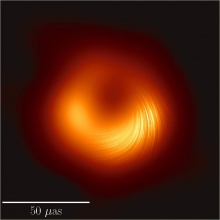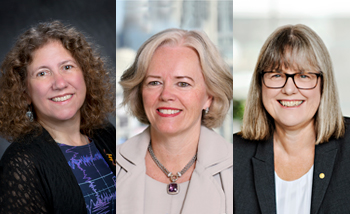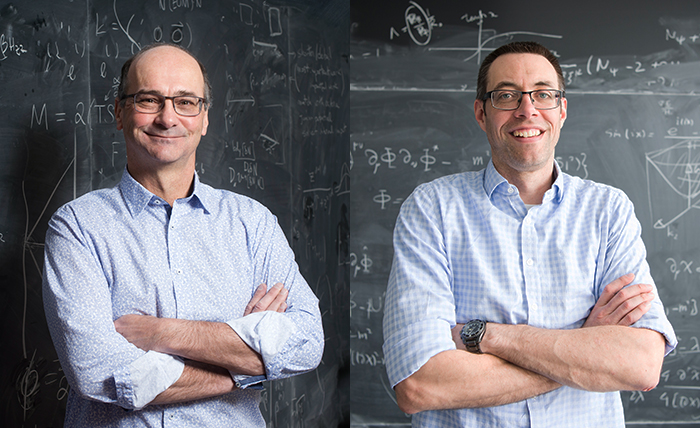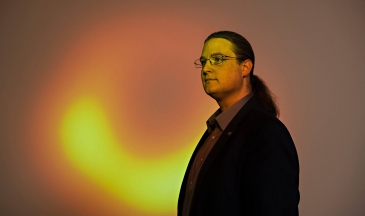Research highlights
New light on M87’s black hole
The Event Horizon Telescope collaboration released a new image of the black hole at the heart of the M87 galaxy in polarized light, detailing the magnetic structure around the event horizon.
“The EHT has lived at the cutting edge of radio astronomy its entire life. It is a kind of high-tech incubator for science,” says Avery Broderick, the Delaney Family John Archibald Wheeler Chair at Perimeter. “Now, the algorithms that we’ve developed to produce the most rigorous polarized images in the history of the field can percolate out to more routine use, unveiling magnetic fields across the universe.” Read more.
DESI launches five-year quest to understand the universe
The Dark Energy Spectroscopic Instrument (DESI), an international collaboration aiming to unravel the mystery of dark energy and fill in our 3D map of the universe, officially began on May 17.
“DESI is a new scientific instrument, on a retrofitted telescope, that measures the distances to galaxies,” says Perimeter computational scientist Dustin Lang, who is one of the researchers who did the intense software work and data collection required to make DESI’s observations possible. There have been surveys of galaxies before – most recently the Sloan Digital Sky Survey – but DESI is more powerful than Sloan by a factor of 20.
“All the elements of DESI’s design are pushed toward doing a lot of measurements, fast,” explains Lang. “We mass-produce galactic data.” Read more.
CHIME telescope detects more than 500 mysterious fast radio bursts
The Canadian CHIME telescope announced its detection of 535 new fast radio bursts (FRBs) during its first year of operation (between 2018 and 2019) – making it by far the world’s most successful hunter of these distant, mysterious explosions. Scientists with the CHIME Collaboration, including researchers at Perimeter, will receive the 2022 Lancelot M. Berkeley − New York Community Trust Prize for Meritorious Work in Astronomy.
“By adapting the existing CHIME telescope and software and adding the custom-built CHIME/FRB computer cluster, we were able to continuously search huge patches of sky for FRBs and transform the field from occasional, one-off detections to a continuous stream of discoveries,” says Dustin Lang, a computational scientist at Perimeter. Read more.
Neural networks reach new peaks of optimization
Estelle Inack, the Francis Kofi Allotey Fellow at Perimeter, has developed a neural network that can help pick the best solution when problems are complex and many solutions are possible – and she launched a start-up! Read more.
The snowy route to a spin-foam breakthrough
“Our dream is to simulate a huge spacetime, a huge number of chunks of spacetime,” says Perimeter Faculty member Bianca Dittrich. “Then we can start to ask questions: How would they assemble? Would it be possible for them to assemble into a Schwarzschild black hole? Could they form gravitational waves?” Dittrich and her collaborators are on the edge of being able to conduct the first numerical test of the 30-year-old theory known as loop quantum gravity. Read more.
Researchers achieve first quantum simulation of baryons
A team of researchers led by Christine Muschik, an associate faculty member at Perimeter and assistant professor at the Institute for Quantum Computing (IQC) at the University of Waterloo, has performed the first-ever simulation of baryons on a quantum computer. Read more.
People and Achievements
The torch is passed: Michael Serbinis becomes PI Board Chair
In May, global technology leader and entrepreneur Michael Serbinis was named the new Chair of Perimeter’s Board of Directors, the role held since Perimeter’s inception by its founder, Mike Lazaridis (who is now Founding Chair Emeritus). Serbinis worked alongside Elon Musk at Zip2 and went on to co-found and build Kobo, Critical Path, DocSpace, and now League.
“Mike Serbinis is the best of Canada’s young tech vanguard,” says Perimeter Director Robert Myers. “He’s a builder steeped in science, and brings the energy and daring Perimeter needs to build a brighter future.”
Serbinis thinks of Perimeter as a 100-year project: “Perimeter is a long-term investment that will pay off exponentially. The work we do here will yield profound results – not only for the future of technology, but for the future of Canada and all of humanity.”
In October, the Calgary Herald published an op-ed by Serbinis entitled, “It’s time to double-down on Canadian science and tech investment.”
Read more about the journey that led Serbinis to Perimeter.
New roles and new faces
Three women have taken new roles on Perimeter’s Board of Directors: Jane Kinney is now Vice Chair, while Gabriela González of Louisiana State University and Nobel Laureate Donna Strickland of the University of Waterloo are newly appointed. “I think getting people excited about science is the key to the future of science,” Strickland says.
Perimeter has also welcomed Paul Smith as new Chief Operating Officer and Managing Director. Smith brings a wealth of experience in scientific research and management, and is a named inventor on 78 patents.
Dominic Else, a rising star in theoretical quantum matter, recently joined Perimeter’s faculty, where he will be working with scientists at the Institute’s Clay Riddell Centre for Quantum Matter. Perimeter congratulates Else, who is co-winner of the 2022 New Horizons in Physics Prize for breakthroughs in the study of quantum matter.
Theoretical cosmologist Katherine (Katie) Mack is joining the Institute as the inaugural Hawking Chair in Cosmology and Science Communication. Mack, also the critically acclaimed author of The End of Everything, has emphasized sharing science with the wider public throughout her career.
Two new researchers have also joined Perimeter as associate faculty. Mathematical physicist Theo-Johnson Freyd, cross-appointed with Dalhousie University, was recently named an inaugural member of the Simons Collaboration on Global Categorial Symmetries. Anton Burkov is a quantum matter theoretical physicist and professor at the University of Waterloo, who will be working closely with researchers at Perimeter’s Clay Riddell Centre for Quantum Matter.
Visionary support from the Province of Ontario
In November, The Honourable Jill Dunlop, Ontario Minister of Colleges and Universities, formally announced $24M in continued support of Perimeter Institute’s research, training, and outreach.
“Ontario is committed to supporting trailblazing work that will help ensure the province remains a leader in advanced science, technology, and innovation, and is a jurisdiction of choice for scientific research,” said Minister Dunlop during a November 9 event in Perimeter’s atrium.
“With this investment, the province will be in a better position to attract, develop, and retain talented researchers so we can continue making major advances and solving the complex problems facing us today, right here in Ontario.”
Awards and honours
Perimeter researchers earned recognition for pushing physics in important new directions.
Two Perimeter Institute scientists are among the world’s most highly cited researchers. The 2021 Highly Cited Researchers list from Clarivate Analytics includes Perimeter Institute’s Director Robert Myers and Associate Faculty member Will Percival, who is also a faculty member and director of the Waterloo Centre for Astrophysics at the University of Waterloo.
Perimeter Associate Faculty member Roger Melko has been awarded this year’s Brockhouse Medal. Awarded by the Canadian Association of Physicists (CAP) and the Division of Condensed Matter and Materials Physics (DCMMP), the prize recognizes Melko “for his work on the theoretical understanding of many-body quantum systems through large-scale computer simulations.”
The Canadian Hydrogen Intensity Mapping Experiment fast radio burst (CHIME/FRB) team will receive the 2022 Lancelot M. Berkeley − New York Community Trust Prize for Meritorious Work in Astronomy. CHIME has become the world’s most successful FRB hunter, thanks in large part to software developed by a team led by Kendrick Smith, who holds the Daniel Family James Peebles Chair at Perimeter.
The Event Horizon Telescope (EHT) collaboration, including members of Perimeter’s EHT Initiative, received the 2021 Group Achievement Award in astrophysics from the Royal Astronomical Society. EHT scientist Avery Broderick – the Delaney Family John Archibald Wheeler Chair at Perimeter and an Associate Professor of Physics and Astronomy at the University of Waterloo – was an inaugural recipient of the Excellence in Science Research Award, from Waterloo’s Faculty of Science.
Perimeter Faculty member Timothy Hsieh has been honoured with an Early Researcher Award from the Ontario Ministry of Colleges and Universities. The grant of $140,000 will help Hsieh advance his research, which bridges theory and experiment at the forefront of quantum matter.
Career Trajectories in Physics
The interests of fundamental researchers and tech companies, perhaps surprisingly, are not so far apart. Explore these intersections of theory and application.
Two kilometres underground in SNOLAB, the hallowed halls of Cambridge, the full-tilt tech world of Waterloo or Silicon Valley: Perimeter students learned that a career in physics can take you anywhere during two career development events.
Susama Agarwala, a staff scientist at Johns Hopkins University, used applied mathematics to reframe the conversation about why women leave physics.
Find resources and success stories for careers in academia and industry, check out current job postings, and learn more about Perimeter’s inclusion, diversity, equity, and accessibility initiatives.
Training and Outreach
Budding scientists and educators connect from around the world
Perimeter Scholars International, an intensive one-year master’s program in theoretical physics, was held entirely online for the first time in 2020/21. The graduating class included 21 students from 14 countries. Eight PSIons are continuing at Perimeter to pursue PhDs, while others will follow paths elsewhere as researchers, entrepreneurs, and innovators.
From Chile to South Africa to Waterloo, high school students found their community at Perimeter’s International Summer School for Young Physicists – and connections that could last a lifetime.
Physics can be a daunting, ever-changing topic, and one that’s hard to teach. But with engaging activities and easy-to-use tools, 40 teachers who attended Perimeter’s Online Teachers’ Camp are now fearless in physics. “The lesson plans and resources are honestly fail-proof,” said Alberta teacher Hayley McKay.
In celebration of the International Day of Women and Girls in Science, Perimeter hosted a question and answer session with four women whose research spans the depths of the oceans to the farthest reaches of the universe. For the first time, the Inspiring Future Women in Science event was held entirely online, reaching more than 450 students and teachers from 25 countries.
Fun stuff
This fall, Perimeter launched its inaugural Kitchen Wars contest – a low-stakes, high-fun online contest in which members of Perimeter’s Teacher Network submitted their best homemade science demo.
Viewers voted on their favourites, and the winning video was “The Rave of Hot Particles,” by Sonia Castro, a high-school physics teacher in Bogota, Colombia. Check out her winning video:
During the Summer Games, we shared a “Slice of PI” exploring The Physics of Olympic Sports, which was accompanied by a free downloadable poster. Perimeter now offers more than 20 free posters celebrating scientific concepts, women in physics, and quirky scientific trivia.
Are you an Einstein about Einstein? Test your knowledge with Perimeter’s quiz about the famous physicist, and see how you fare on our other science quizzes.
Public Lecture webcasts
Despite the challenges posed by pandemic restrictions, Perimeter’s long-running Public Lecture Series continued with a series of fascinating virtual talks with international scientists.
Here’s a Perimeter webcast with Katie Mack, who will join Perimeter in June 2022 as the Institute’s inaugural Hawking Chair in Cosmology and Science Communication:
Other fascinating talks from the Public Lecture Series included:
- What we currently know about the nature of dark matter and black holes in “The Invisible Universe” with Priyamvada Natarajan
- Grasping the enormity of space in “Mapping the Universe with eBOSS” with Perimeter Associate Faculty member Will Percival
- A journey into the mathematical, physical, and biological workings of “Morphogenesis” with L. Mahadevan
- Examining the fascinating mathematics that provide “A Solution to the Stable Marriage Problem” with Emily Riehl
- Getting “A New View of the Universe from the Earth’s South Pole” with IceCube Neutrino Observatory scientist Naoko Kurahashi Neilson
- Delving into the “Secrets of the Universe” with physicist and documentary star Manuel Calderón de la Barca Sánchez
About PI
Perimeter Institute is the world’s largest research hub devoted to theoretical physics. The independent Institute was founded in 1999 to foster breakthroughs in the fundamental understanding of our universe, from the smallest particles to the entire cosmos. Research at Perimeter is motivated by the understanding that fundamental science advances human knowledge and catalyzes innovation, and that today’s theoretical physics is tomorrow’s technology. Located in the Region of Waterloo, the not-for-profit Institute is a unique public-private endeavour, including the Governments of Ontario and Canada, that enables cutting-edge research, trains the next generation of scientific pioneers, and shares the power of physics through award-winning educational outreach and public engagement.
You might be interested in

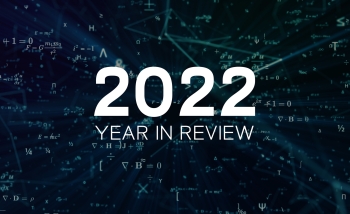
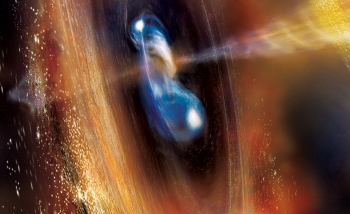
News Release: Cosmic explosion leads to first-of-its-kind gamma-ray burst detection
December 6, 2022

